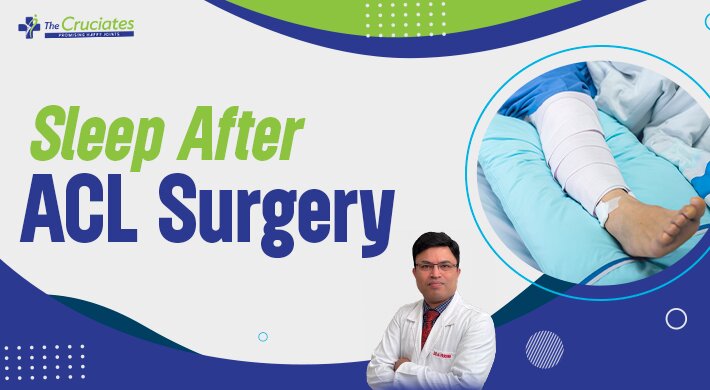[rank_math_breadcrumb]
A common question people have after ACL surgery is how to get good night’s sleep after ACL surgery because it can be very hard in the first few days. Sometimes, it can be confusing to understand what’s really happening. You might find yourself having trouble going to sleep, waking up frequently throughout the night, or even getting leg cramps while you’re trying to get some rest.
Many times, you might ask yourself, what should I be doing differently? How long will it take to get back normal sleep routine? Are there any other tips I need to know? However, improving sleep after ACL surgery, there are several simple things that can be done to make things easier on your body and to improve your chances of getting a good sleep. Here are some tips you can follow in order to get a good night’s sleep after ACL surgery.
Table of Contents
Sleep Disturbance Immediately After Anterior Cruciate Ligament (ACL) Surgery
Sleep cycle after ACL surgery can vary from person to person. Immediately after surgery, the first few days of sleep are typically the toughest and people struggle to find a comfortable position for sleep. It is very important to find a good sleeping rhythm. Sometimes, it can be difficult for some people to find the right sleeping rhythm. That’s why it is important to talk about your sleeping habits and symptoms with your doctor or physical therapist before you make changes.
Early period of ACL recovery is challenging for most of the people and may only achieve small episodes of 2 to 4 hours of sleep at a time. Soon after ACL surgery, knee is likely to be heavy due to swelling and may have pain. In addition, knee will be less flexible, which makes finding a comfortable position more difficult. Wearing a long knee brace to keep the knee straight while sleeping gives rest to surgical site and will reduce the pain.
What Kind of Pillow Should I Use?
– Sleep in whatever position makes you comfortable.
– Always use a soft pillow.
– If you prefer to Sleep on your side always insert a pillow between your legs.
– If you’re lying flat on your back, use a thin pillow at ankle not behind knee. Keeping pillow behind knee will result in flexion contractures which will make recovery difficult.
Role of Medications After ACL Surgery
Take pain medicines as prescribed at the time of discharge. The numbing effect will reduce the pain and helps in getting better sleep.
Is There Something Else I Can Do?
If you are experiencing difficulty sleeping after ACL surgery, there are a variety of measures you can take to improve your sleep. For example, applying a combination of measures before you go to bed. Some people find it helpful to get into a routine with their sleep schedule. They may go to bed and wake up at the same time every day, which can help reduce the amount of stress they have and make it easier for them to fall asleep.
Carry Home Message: -
– Sleep in whatever position makes you comfortable.
– If you prefer to Sleep on your side always insert a soft pillow between your legs.
– Speak about your sleeping habits and symptoms with your doctor before you make any changes.
– Wearing a long knee brace to keep the knee straight while sleeping gives rest to surgical site and will reduce the pain.
– Always apply ice at night before you go to sleep.
– Take pain medicines as prescribed at the time of discharge.
– Sleeping pills should be avoided and not recommended for routine usage.
The Cruciates is a team of highly experienced and skilled surgeons who are in the sports medicine field from a long time and have dealt with complicated sports injuries. Dr. Nagendra Prasad is one of the best arthroscopy surgeons in India leads the team. The Cruciates is committed to deliver high-quality services and would like to make sure that, you are satisfied with our work. The team Cruciates provides customized treatment and follow up to each patient to make sure that everyone will achieve desired level of recovery and rehabilitation to ensure early return to sports.
WE WISH YOU A SPEEDY RECOVERY

